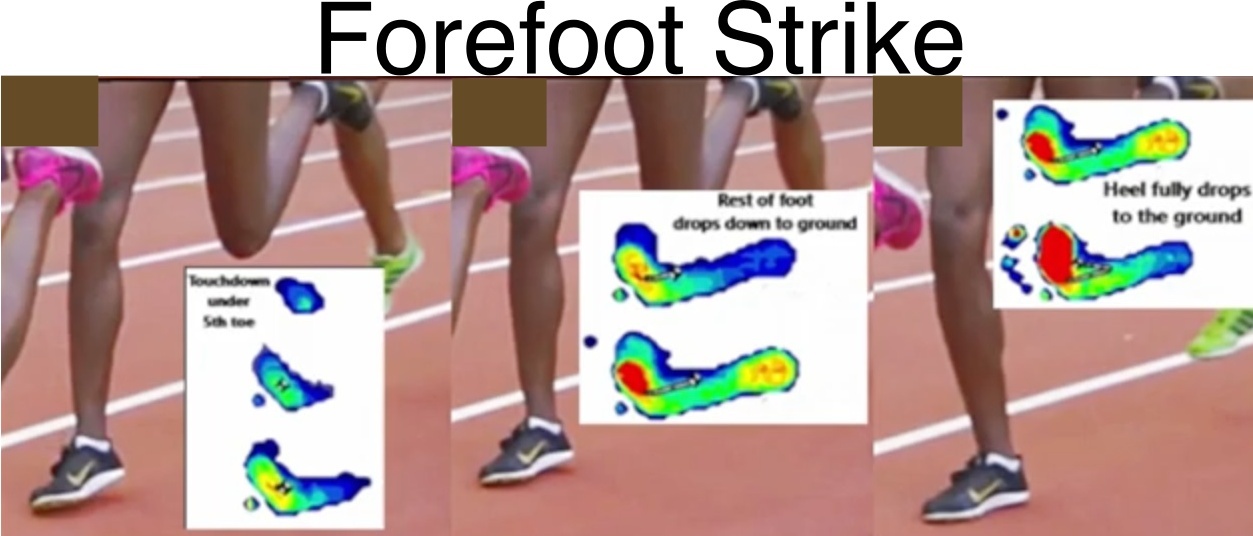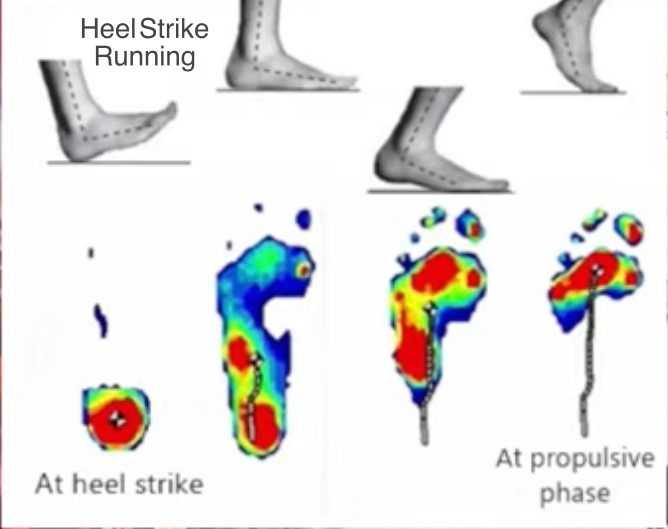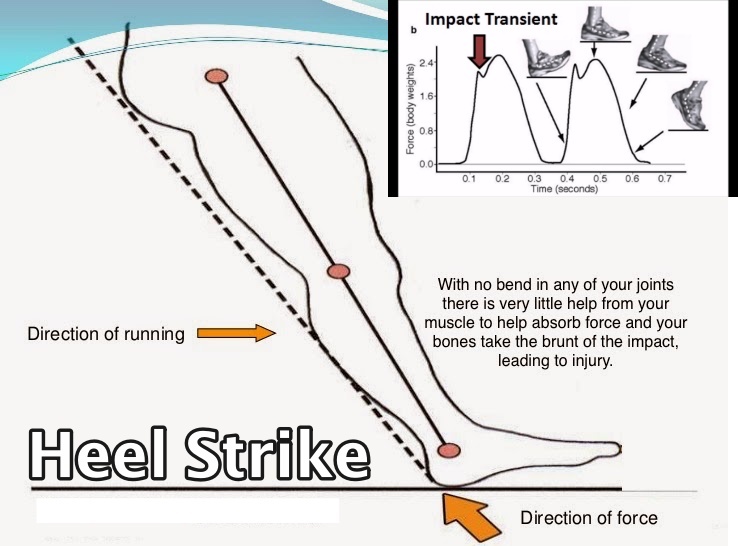One of the main reasons heel toe running, also known as heel strike running, is bad is that it produces a long list of impact forces that directly causes most running injuries.
One form of impact thats highly injurious produced in heel strike running, but not in forefoot running, is known as a stress-wave.
A study in the Journal Biomechanics reported that the stress-wave in heel striking overloads the lower leg, including the knee, by 50%-90%! This is also energetically costly because the leg’s muscles and soft tissues use more energy to attenuate the excessive impact.
Moreover, two reports in The American Journal of Sports Medicine and in The Current Opinions in Orthopaedics revealed that the list of injuries associated with the heel strike stress-wave is long, and includes:
- knee pain
- medial or posterior tibial pain
- Achilles tendonitis
- plantar fasciitis
- ankle pain
- mid-foot symptoms
- stress fractures of the tibial, tarsal, metatarsal and femur
Obviously, the only way to avoid these injuries is to eliminate the risk factors that cause them of which eliminating the stress-wave would be the best starting place!
What’s remarkable is forefoot running prevents these injuries because the stress-wave is NOT generated!
A report in the journal Foot & Ankle International found that landing with a forefoot strike when running stops the flow of impact up the leg by localizing impact absorption to the forefoot, mid-foot and ankle. This also eliminated the rapid rise in heel impact that’s associated with heel strike running.


Likewise, a study in the journal Medicine and Science in Sports and Exercise found another way forefoot running prevents injury in that it was found to reduce foot-ground impact because foot-ground contact time was reduced as compared with heel strike running. This means that by landing forefoot-first when running, the foot spends less time on the ground and results in a contact with the ground that’s so brief that certain impact variables are not fully produced or produced at all.
Even better, because the stress-wave is eliminated, forefoot running converses more energy because the muscles are no longer required to attenuate high impact.
All in all, this is how forefoot running will do more than just prevent injuries, it lowers energy costs in many ways, which is why is more efficient than heel strike running.
In that regard, here’s the research on why forefoot running is more efficient than heel strike running:
One way forefoot running is faster than heel strike running is that its more energy efficient because it enables significantly more energy-saving elastic power in the Achilles tendon! Read more here!
Forefoot running is more energy efficient than heel strike running because it naturally allows for a higher stride angle. Read more here!
References:
Altman AR, Davis IS (2011) Comparing barefoot running to an altered strike patterns. Med Sci Sports Exerc 43(5):S717
Daoud AI, Geissler GJ, Wang F, Saretsky J, Daoud YA, Lieberman DE (2012) Foot strike and injury rates in endurance runners: a retrospective study. Med Sci Sports Exerc. doi: 10.1249/MSS.0b013e3182465115
Forner, A., Garcia, A.C., Alcantara, E., Ramiro, J., Hoyos, J.V., and Vera, P.: Properties of shoe insert materials related to shock wave transmission. Foot Ankle Int., 16:778-786, 1995.
James, L.J., Bates, B.T., and Osternig, L.R.: Injuries to runners. Am. J. Sports Med., 6:40-50,1978.
Light, L.H., McLellan, G.E., and Klenerman, L.: Skeletal transients on heel strike in normal walking with different footwear. J. Biomech., 13:477-80, 1980.
Marti, B., Vader, J.P., Minder, C.E., and Abelin, T.: On the epidemiology of running injuries. The 1984 Bern Grand-Prix study. Am. J. Sports Med., 16:285-94, 1988.
Nigg BM (1997) Impact forces in running. Curr Opin Orthop 8(VI):43–47.
If you’d like, you can support Run Forefoot and help keep it going by making a donation in any amount of your choosing:

Or, you can also support Run Forefoot by shopping at the following top minimalist shoes brands, and be sure to bookmark the links:
Be Lenka: https://www.dpbolvw.net/click-7600968-14330828
FeelGrounds: https://www.feelgrounds.com/?p=RunForefoot
Xero Shoes: https://xeroshoes.com/go/Run_Forefoot
Iguaneye: https://www.iguaneye.com/?ref=8tfXVc92
Soft Star Shoes: https://shrsl.com/3mp1b
Wilding Shoes: https://bit.ly/3lIygQP
Earth Runners: https://earthrunners.com/?rfsn=6763579.f7f9c9
Vivobarefoot: https://shrsl.com/3kvih
Zappos: https://goo.gl/J1CeAd

Bretta Riches
BSc Neurobiology; MSc Biomechanics candidate, ultra minimalist runner & founder of RunForefoot. I was a heel striker, always injured. I was inspired by the great Tirunesh Dibaba to try forefoot running. Now, I'm injury free. This is why I launched Run Forefoot, to advocate the health & performance benefits of forefoot running and to raise awareness on the dangers of heel striking, because the world needs to know.
Latest posts by Bretta Riches (see all)
- Can You Run In Barefoot Shoes? Yes, But DON’T Heel Strike! - 21/07/2024
- Why Cushioned Running Shoes Are Really Bad for Your Feet - 19/07/2024
- Do Cushioned Running Shoes Cause Injuries? - 17/07/2024

